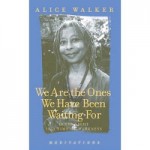Let’s Find the Humane Way: by Motswana writer, Lauri Kubuitsile
Republished from Lauri’s blog: Thoughts From Botswana
There is a bit in Alice Walker’s We are the Ones We have Been Waiting For: Inner Light in a Time of Darkness that keeps running through my head. She talks about a tribe in South Africa, the BaBemba. In this tribe, when someone does something wrong, the whole tribe comes out. They put the offender in the middle of the circle and then everyone has a turn to tell the person in the middle something good that the accused person has done in their life. They tell the person about every good word they’ve uttered or kind act that they have done. Then when they are finished, when everyone in the tribe has had their chance to speak, the person is welcomed back into the tribe.
There is something so lovely about this. The thought that bad is just an accident and it is only to remind a person of their goodness and the bad is washed away and the good takes over control once again. It seems such a humane way for society to act; such an optimistic way to view humanity.
Social customs, at their best, are there to temper our base human nature and this one does that in such a beautiful way. Most of us, me included, rush to punishment when I’m wronged, but that is bare nature without morality applied. Culture and social norms should make us better, not worse.
I watched a TV show late last night about two brothers in Kansas who went on a terrible killing spree. They’ve been given the death sentence and are currently in the middle of the long appeal process that precedes executions in America. In the trial, during mitigation, their lawyer showed a picture of the brothers when they were children; they looked about 5 and 7.They were little boys with eyes still hopeful, not like the men who sat in the court room applying Chapstick while they learned they’d been sentenced to death. Many things happened between that photo and the day of sentencing. Each punishment didn’t push away the thin shell of bad and reveal to the boys their intrinsic goodness. Instead, the punishment strengthened the bad and forced the good under yet another layer looking for protection from the barrage.
I’m not so idealistic to think we could snap our fingers and solve all of our problems of crime in such a way; but I do think we should set a high goal to head toward and perhaps there are answers to be found in the BaBemba’s way. I also know small steps can make a difference. It surprising what recognition of the goodness in the other can do. It echoes in our ears days and weeks after we hear it. We store those cherished words like jewels in hidden places and pull them out to gives us strength when the tide turns. A big store of them helps to make us believe that those words are indeed who we are.
Pointing out the bad can do the same. Those words also have their hidden places. They too are brought out for reinforcement; they give added evidence to what is being said by another. You are bad. You are useless. You are stupid. It must be true since you have so much proof that it’s so.
At the very least, we should try to move through our lives without causing harm, but imagine the change that you can make by pointing out the good in people. Telling them; letting those words settle in the person’s thoughts and take up permanent residence there. You’re not only making their day, you’re giving them the arsenal to prepare for a better future, and a reminder that they are designed, as we all were originally, for goodness.



